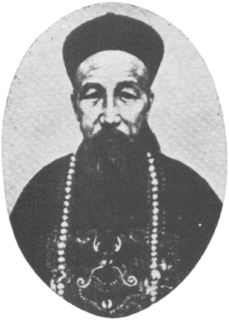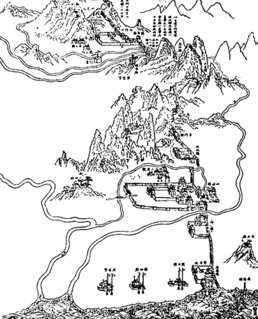
The Taiping Rebellion, also known as the Taiping Civil War or the Taiping Revolution, was a massive rebellion or civil war that was waged in China from 1850 to 1864, between the Manchu Qing dynasty and the Hakka-led Taiping Heavenly Kingdom – though following the fall of Nanjing the last rebel army was not wiped out until 1871. After fighting the bloodiest civil war in world history, with 30 to 50 million dead, the established Qing government won decisively, although the outcome is considered a pyrrhic victory.

The Xianfeng Emperor, or by temple name Emperor Wenzong of Qing (清文宗), given name Yizhu (奕詝), was the eighth Emperor of the Qing dynasty, and the seventh Qing emperor to rule over China proper, reigned from 1850 to 1861. During his reign the Qing dynasty experienced several wars and rebellions including the Taiping Rebellion, Nian Rebellion, and Second Opium War. He was the last Chinese emperor to have total executive ruling power. After his death, the Qing dynasty was controlled by Empress Dowager Cixi.

Zeng Guofan, Marquis Yiyong, birth name Zeng Zicheng, courtesy name Bohan, was a Chinese statesman, military general, and Confucian scholar of the late Qing dynasty. He is best known for raising and organizing the Xiang Army to aid the Qing military in suppressing the Taiping Rebellion and restoring the stability of the Qing Empire. Along with other prominent figures such as Zuo Zongtang and Li Hongzhang of his time, Zeng set the scene for the Tongzhi Restoration, an attempt to arrest the decline of the Qing dynasty. Zeng was known for his strategic perception, administrative skill and noble personality on Confucian practice, but also for his ruthlessness in repressing rebellions.

Jiangnan or Jiang Nan is a geographic area in China referring to lands immediately to the south of the lower reaches of the Yangtze River, including the southern part of its delta. The region encompasses the city of Shanghai, the southern part of Jiangsu Province, the southeastern part of Anhui Province, the northern part of Jiangxi Province and the northern part of Zhejiang Province. The most important cities in the area include Anqing, Changzhou, Hangzhou, Nanjing, Ningbo, Shaoxing, Suzhou, Wuxi, Wenzhou, and Zhenjiang.

The Nian Rebellion was an armed uprising that took place in northern China from 1851 to 1868, contemporaneously with Taiping Rebellion (1851–1864) in South China. The rebellion failed to topple the Qing dynasty, but caused immense economic devastation and loss of life that became major long-term factors in the collapse of the Qing regime in the early 20th century.

Feng Zicai (1818–1903) was a general in the Imperial Army during the Qing dynasty. He was originally a bandit from Qinzhou, Guangxi, China.
Li Shixian was a pre-eminent military leader of the late Taiping Rebellion. He was the cousin of military leader Li Xiucheng and was known for being very tall for a native of Guangxi province, standing at 2 metres (6.6 ft) tall. During his military tenure, he was given the title of King of Shi (侍王). In the latter part of the Taiping rebellion, he led Taiping forces to many military victories. Later in his life, he invited an aging Wei Yuan to live in his home and was known to hold counsel with the famous scholar. He was eventually assassinated by a traitor in Guangdong.
Bao Chao (1828–1886) was an eminent Han Chinese official, military Captain General, of the late Qing Dynasty in China. He raised the Xiang Army to fight effectively against the Taiping Rebellion and restored the stability of Qing Dynasty along with other prominent figures, including Zuo Zongtang and Zeng Guofan, setting the scene for the era later to fight against known as the "Nien Rebellion". He was known for his military perception.
Cheng Xueqi (Chinese: 程學啟; courtesy name Fangzhong 方忠; born in Tongcheng, Anhui, was a general of the Taiping Rebellion who surrendered to the Qing dynasty in 1861 with Ding Ruchang. He was an eminent Han Chinese official and a Captain General in the army of the late Qing dynasty. He led the Huai Army to fight effectively against the Taiping rebels and helped to restore the stability of Qing, along with other prominent figures, including Li Hongzhang and Zeng Guofan, setting the scene for the successful defense of Shanghai and the Suzhou Massacre POW Incident. The Tongzhi Emperor praised Cheng as "intelligent and brave".
Jiangnan Daying (Chinese: 江南大營 or the Jiangnan Battalion; was an army group assembled by the Qing dynasty. The army group consist of mostly Green Standard Army, and their goal was to quell the Taiping Rebellion around the Jiangnan region. The army group twice encircled Nanjing, the capital of the Taiping Heavenly Kingdom, but were defeated by the Taiping forces on both occasions.
Jirhangga was an eminent Manchu official in the late Qing dynasty. He served as the Governor of Jiangsu, which belonged to Bordered Yellow Banner, and was appointed to that post by Imperial Commissioner Xiang Rong (向榮). He was killed in action by rebels during the Taiping Rebellion.
The First rout of the Jiangnan Battalion took place between 1853 and 1856 when the Qing government raised the Green Standard Army to fight against the Taiping Heavenly Kingdom. The action involved Qing forces surrounding the city of Nanking, the capital of the Taiping Heavenly Kingdom.
The Battle of Jiangnan (1860), also known as the Second rout of the Jiangnan Battalion was a battle between the Qing government's Green Standard Army and the army of the Taiping Heavenly Kingdom during the Taiping Rebellion. The Green Standard Army twice attempted to besiege Nanjing, capital of the Taiping Heavenly Kingdom, but was unable to break through. To break the siege of Nanjing, the Taiping forces maneuvered to divert Qing forces by sacking Hangzhou, before quickly moving back to Nanjing to counter-encircle the Qing siege forces and routing the Green Standard Army garrison completely, breaking the siege of Nanjing.
Xiang Rong was a Chinese military general and politician. He was born in Wuxi County, Chongqing, and was promoted from the rank of a foot soldier during the later years of the Qing dynasty (1636–1912). He was involved in early military operations against the Taiping Rebellion in Henan from 1850 onwards. From then he was a Senior Colonel, after one year the military promoted him be the tidu (提督) of Guangxi, even though he failed, he made the Taiping believers flee Guangxi.

The Taiping Heavenly Kingdom, later shortened to Heavenly Kingdom or Heavenly Dynasty, was an unrecognized oppositional state in China and Chinese Christian theocratic absolute monarchy from 1851 to 1864, supporting the overthrow of the Qing dynasty by Hong Xiuquan and his followers. The unsuccessful war it waged against the Qing is known as the Taiping Rebellion. Its capital was at Tianjing.

The transition from Ming to Qing, Ming–Qing transition, or Manchu conquest of China from 1618 to 1683 saw the transition between two major dynasties in Chinese history. It was the decades-long conflict between the emergent Qing dynasty (清朝), the incumbent Ming dynasty (明朝), and several smaller factions in China. It ended with the rise of the Qing, and the fall of the Ming and other factions.

The Qing dynasty (1636–1912) was established by conquest and maintained by armed force. The founding emperors personally organized and led the armies, and the continued cultural and political legitimacy of the dynasty depended on the ability to defend the country from invasion and expand its territory. Therefore, military institutions, leadership, and finance were fundamental to the dynasty's initial success and ultimate decay. The early military system centered on the Eight Banners, a hybrid institution that also played social, economic, and political roles. The Banner system was developed on an informal basis as early as 1601, and formally established in 1615 by Jurchen leader Nurhaci (1559–1626), the retrospectively recognized founder of the Qing. His son Hong Taiji (1592–1643), who renamed the Jurchens "Manchus," created eight Mongol banners to mirror the Manchu ones and eight "Han-martial" banners manned by Chinese who surrendered to the Qing before the full-fledged conquest of China proper began in 1644. After 1644, the Ming Chinese troops that surrendered to the Qing were integrated into the Green Standard Army, a corps that eventually outnumbered the Banners by three to one.
Events from the year 1860 in China.
Events from the year 1856 in China.








